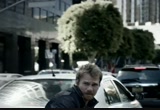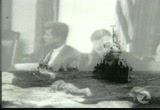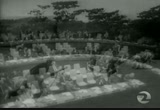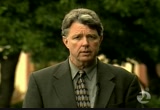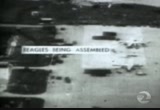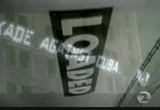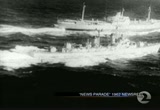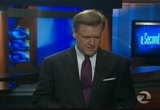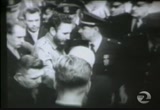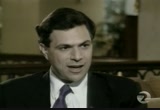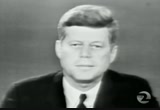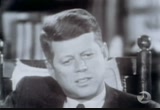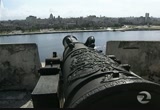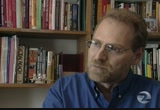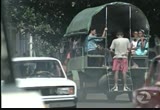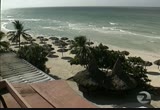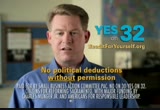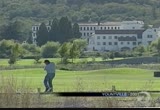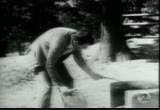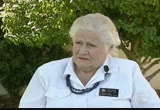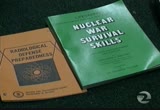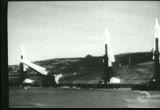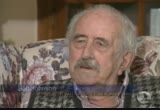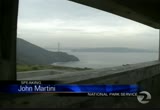tv Second Look FOX October 21, 2012 11:00pm-11:30pm PDT
11:00 pm
up next on a second look, it brought the united states and the soviet union to the brink of nuclear war 50 years ago. how the cuban missile crisis began and how president kennedy searched for a way to keep from possibly going into war. and how the bay area prepared for the cold war with nuclear missile bases. >> reporter: hello everyone i'm
11:01 pm
frank somerville and welcome to a second look. 50 years ago tonight the world waited and watched to see if the united states would go into war with russia. a missell took pictures that revealed the soviet had built missile bases. it turned out the missells had already been there for three months. back in 2001, ktvu reporter george watson brought us this look back at those tense days when the united states and the soviet union stood on the brink of nuclear war, each waiting to see if the other would blink. >> a picket line of american warships cruised the waters off the coast of cuba. soviet ships possibly carrying nuclear missiles had been warned to turn back. it was a deadly dance at high noon in the sea. the cuban missile crisis took
11:02 pm
the world to the brink of the unthinkable. >> in the cold war it's the closest we came to nuclear war. >> reporter: in response the united states cut off all aid to cuba. a year later an army of cuban exiles attempted unsuccessfully to overthrow the government of castro by invading cuba at a place called the bay of pace. there was evidence the invasion had been planned and financed by the u.s. even down to the training of the cuban exiles at a military base in guatemala. the united states denied any such involvement in a carefully worded at the same time -- worded statement to the united nations. >> the united states has created no aggression against cuba. >> this was fertile ground for
11:03 pm
soviet integration. u.s. aerial reconnaissance photos showed approximately 40 soviet offensive nuclear weapons being set up and manned by an estimated 22,000 soviet troops. >> in 1962 there was a missile soviet gap. the soviet union could not afford to build new ones. the solution was to put short range and medium range missiles right in our backyard. the whole world literally was watching to see what president john kennedy would do. >> had kennedy done what the joint chiefs of staff wanted to do which was to invade, that there would have immediately been a nuclear war and it would have started on so called tactical level. at that point in the fall of 1962 them -- then certainly would have spread to all right
11:04 pm
out nuclear war. >> reporter: president kennedy went on television to announce to the world that america was holding the soviet union on whatever might happen in cuba. >> within the past week unmistakable evidence has accomplished the fact that a series of offensive missile sites is now in preparation on that prisoned island. the purpose of these bases can be none other than to provide a nuclear strike capability against the western hemisphere. each of these missiles are capable of striking cape canaveral, mexico city or any other city in the south eastern parts of the united states. >> shall be the policy of this nation to regard any nuclear missile launched from cuba or any nation in the western hepls
11:05 pm
-- hemisphere as an attack. requiring a full retaliatory response. >> it almost seemed the day as if time stood still. the shooting hasn't started yet but there weren't any real encouraging signs that it could be avoided. but worried, alarmed, afraid perhaps even the american public nonetheless appeared determined and resolved. this is walter cronkite, good night. >> president kennedy would play one last card for a peaceful resolution. >> kennedy engaged in the least abnoxious option which is to engage a naval blockade. >> reporter: experts say any invasion fleet would almost certainly been annihilated by the missiles already in place. >> we would have sailed into
11:06 pm
this and i would think unless -- they would not have been able to stop it. >> as the stable stakes that the unite would take no action. >> his ploy had not worked. and by being willing to back down with blowing up the world was in a way saving face. >> the soviets back down in the face of u.s. determination. dismantle their missells and take them home. it was a retreat to moscow. but castro refused to give up the bombers the reds had shipped to cuba. for days this critical point went unresolved. far beyond the scenes the
11:07 pm
russians pulled the strings on their puppet castro. a message directly to president kennedy. >> i have today been informed by chairman that all bombs will be withdrawn in 30 days. he also agreed that these planes can be observed and counted as they leave. >> the u.s. missile crisis finally ended in exchange for an american promise not to invade cuba. in return the united states also agreed to remove their missells from turkey. in 1994 the john f. kennedy library released tapes of the closed door discussions among president kennedy and his advisors as they were looking for a peaceful way out of the
11:08 pm
confrontation with the soviet union. jenkins brought us this report. >> u.s. spy planes had spotted missile sites going up in cuba, the president and his top national security council met at the white house to discuss his options. under secretary of state george fall who died recently cautions against a surprise attack on the mission site. >> it's like pearl harbor. it's the kind of contact that -- kind of conduct that might be expected from the soviet union. >> the question really is would i can take much of a chance of a nuclear. >> of the roughly 15 men at the meeting only president kennedy and his brother robert knew
11:09 pm
they were being recorded. the jfk presidential library was given government clearance in the 1980s to release taped exerts from three other meetings the tapes are the first to cover entire meetings. historians here say nothing on these tapes will dramatically change the public record on the missile crisis. that they give a refinement of what is already known. but the tape will give a look at how they wrestled with the confrontation. >> this is where president kennedy could have gone either way. in retrospect we know that if the united states would have bombed, that would have led to world war iii. >> ted sorenson remembers how close it came to war.
11:10 pm
>> i was asked to try my hand at the kind of ultimatum or warning letter that would recede an air strike. i found that we could not write a letter that would strive history. >> in the end, they called for a blockade of cuba and he went on television to announce his decision. >> i call upon chairman can recollect rushov to end this provocative attempt. the tapes are the basis of
11:11 pm
a new book called the 14th day which says the president continued to worry about how to verify that the missiles in cuba were in fact, gone. just two months after the cuban crisis, president kennedy said the problem is the two nations had so little communication. >> one mistake can make this whole thing blow up, one major mistake by mr. krushov or us here. that's why it's much easier to make speeches about some of the things we autoto be doing. i think that anybody who watches and looking at the fatality list on atomic weapons and sees the communists have a twisted view of the united states and if we don't comprehend them that's what makes life in the 60s hazardous. >> how the united states came to be involved in a fight of wills against cuba.
11:12 pm
11:14 pm
on a second look tonight we're remembering the cuban missile crisis 50 years ago this month. it came only a few years after fidel castro took over the tiny island nation and declared it a communist ally. that would change both the political and economic relationship between the united states and cuba as bryan banmiller explained this this report in 2000. >> reporter: cuba and the united states have shared a tense political and economic history for more than a century. after spain lost the island in the spanish american war in 1898. the u.s. became the dominant power and not a -- >> the farmers created a landless work force that would
11:15 pm
have to work for basically starvation wages in the u.s. owned plantations. >> reporter: peter ross has traveled to russia for a nonprofit think thank. he says decades long discontent led to insurgency by workers under the leadership of castro. socialist rebels decided it was time for u.s. domination to end. >> and the soviet union was there with tremendous offers of aids and over things. it was natural this thing would move forward closer corporations with the soviet union and the united states. >> mr. castro declared cuba a communist republic. president kennedy approved a u.s. sponsored force of cuban exiles to overthrow castro at the fateful bay of pigs. castro surveyed the scene of
11:16 pm
american sponsored defeat. less than two years later the world almost went to war over cuba. >> unmistakable evidence shows that a number of missile sites is now in preparation on that inprisoned island. >> reporter: engineers had secretly installed missiles in cuba capable of destroying the united states. the price for soviet support of the human economy was a military foot hole 90 minutes off the shore. a u.s. block aid forced the soviets to blink first. the process passed and cuba prospered. >> those were really the golden years for economic develop development. if you look at those years, cuba led latin america. >> golden years came to an
11:17 pm
abrupt end when the soviet block collapsed and the soviet union disappeared. cuba lost $600 million in economic aid. the united states intensified its embargo. he rationed goods and urged workers to produce more. >> the rash with the caveat that the cuban economic has been recovering the last few years. >> reporter: in 1997 fidel castro told congress some compromises were necessary to let foreign capital into cuba. he promoted tourism to get much needed foreign currently into the country. >> a fall out shelter. >> and the nike missell batteries that once dotted the marin head lands.
11:20 pm
second look at the cuban missile crisis. the event that brought the united states and cuba to the brink of attack. as bob mackenzie reported back in 2001 a lot of people felt the best chance for survival could be right in their own backyard. >> reporter: civil defense officials estimated americans would have six or seven hours notice to evacuate their city -- their cities if the soviets would send nuclear bombs. at the veteran's home you can still see a concrete building constructed in the 50s with a basement containing what's left of a california state command and control center. communications gear of all kinds, maps of all the california counties, lists of the shelters in every town all gathering dust now. from this windowless room with
11:21 pm
18-inch thick walls, the president of the united states could hunker down and direct rescue operations throughout the state. provided of course that there were still personnel out there to carry out the orders. but soviets developed a rocket capable enough to deliver a bomb, that was the end of evacuation plans. school children had monthly bomb drills. >> we must be ready every day all the time to do the right thing if the atomic bomb explodes. duck and cover. that's the first thing to do. >> as americans learned to duck and cover there was a new emphasis on shelter. survival supplies were stockpiled in large buildings where the public was expectedded to gather during an atomic attack then stay there for days or even weeks to
11:22 pm
escape nuclear fall out falling particless full of falling debris. kitty brit was a young woman with her husband in the armed forces when her neighbors were all building shelters. she thought it was funny. >> when you go out of your hidden place everybody is going to be dead. deadsville, right, nothing. i would rather go when the bomb went off. >> reporter: she says some of her neighbors talked about buying guns. >> and if the man who lives next door max next door decides to come over, no way max we haven't got room for you, boom boom.
11:23 pm
right. >> so people would have gun -- >> they actually said that. >> houses weren't being built with basements. at the height of the panic, squads of door to door sales man would come around offering to build you a fall out shelter right in your backyard, for $3,000 and up a crew would dig a great hole, put a roof on it that was supsedly bombproof and likely sell you all the food and gear you needed so you and your family could borough down there for weeks. remembering the missiles that once gave the bay area its first line of defense.
11:24 pm
rachel and sam have a house. now they want a home. a home where everything feels like it's designed just for them. where the styles they love fit into the wallet they have. big or small they want furniture that makes life better. that's why they visit us. we're more than a home improvement store. we're ikea, the life improvement store.
11:26 pm
united states had missiles ready to go. some of those missiles were right here in the bay area. since the end of the cold war, the united states has removed missile heads from many places in the united states including the bay area. in 1954 the defense went to the next level to some an unthinkable level. the marin headlands became home to a guided battery missile. they were armed with missells. they were more than 300 missile sites. 16 in the bay area and this one
11:27 pm
nestled in the rolling hills of marin was one of them. the missells were designed to stop, mainly the soviets. they had one simple motto, if it flies it dies. >> the hercules had a flight of one minute. it was designed to go up in the air up to 25 miles, make a turn, come down and explode over the top of a group of bombers. >> guidance system was fair. nobody ever knew whether in this area whether you would hit anything or not but you never fired one. >> radar on top would be sweeping all the time. if it detected an incoming flight what they would call
11:28 pm
ufos it would alert. >> and it was soon obsolete. so why is this missile base so meticulously preserved today? why have volunteers most of them former soldiers at the base contributed thousands of man hours over the last 15 years to keep this place in memory? this place where greatfully a shot was never fired in anger. >> it's history, that's the main thing we're all here to preserve. there's very few people in the bay area or united states that even know we had these missile bases around. >> you think about the power they were sitting on to be allowed to come in and bring visitors it's an eerie feeling like you're trespassing a little bit. >> and that does it for this week's a second look.
252 Views
IN COLLECTIONS
KTVU (FOX) Television Archive
Television Archive  Television Archive News Search Service
Television Archive News Search Service 
Uploaded by TV Archive on

 Live Music Archive
Live Music Archive Librivox Free Audio
Librivox Free Audio Metropolitan Museum
Metropolitan Museum Cleveland Museum of Art
Cleveland Museum of Art Internet Arcade
Internet Arcade Console Living Room
Console Living Room Books to Borrow
Books to Borrow Open Library
Open Library TV News
TV News Understanding 9/11
Understanding 9/11